As an Amazon Associate I earn from qualifying purchases.
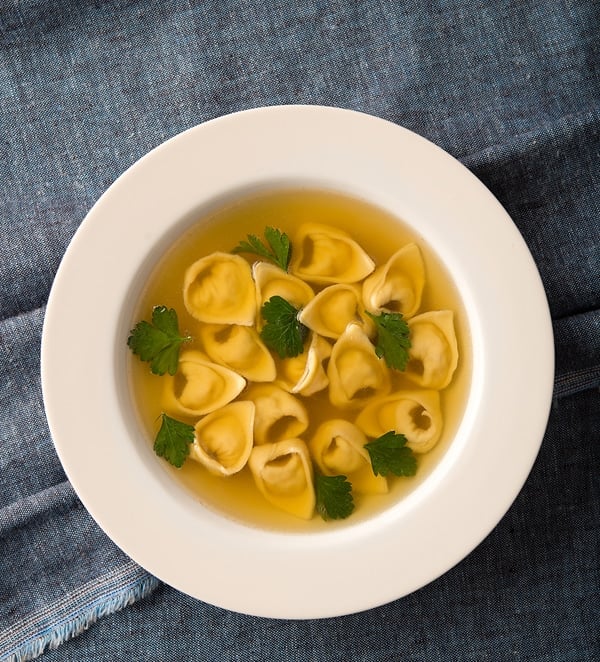
As excited as I was to roast the first chicken I’d bought from the home in years, I have to say I was even more excited for the leftovers. I knew exactly what I’d be doing with the remnants of the chicken I bought from Dinner Bell Farm: the great Tuscan classic, tortellini in brodo, little filled dumplings floating in broth. But this dish is so much more than that.
Tortellini in brodo is a perfect example of why simple is not necessarily easy. At first glance, there’s not that much going on in this pretty bowl of soup. Just a clear broth and a bunch of little dumplings, maybe a parsley leaf or two. But look closer.
First, you need to make the broth. Yes, you could use store-bought chicken broth, but why would you? If you are going to the trouble to make tortellini, you might as well make the broth while you’re at it — you can make them both at the same time, and they take more or less the same amount of time to do. I used the leftover carcass from the roast chicken, along with the wings for some added meat.
With that simmering away, you make the pasta dough, which of course has lots of egg yolks in it — golden yellow is the color you’re looking for in this whole dish, by the way. Then the filling, which is from some leftover breast meat (thigh meat works, too), parmesan cheese and a touch of nutmeg.
Making tortellini is absolutely a labor of love. And for a guy, it’s even more so. Why? Because we have fat fingers. I can make the larger tortelloni or tortelli no problemo, but there you’re dealing with a pasta shape often twice the size of these little bundles of yum.
To make these, I need to wrap the dumpling around my pinkie, which takes some getting used to; you normally use your forefinger. I think this is why they have little girls make the tortellini in Italy…
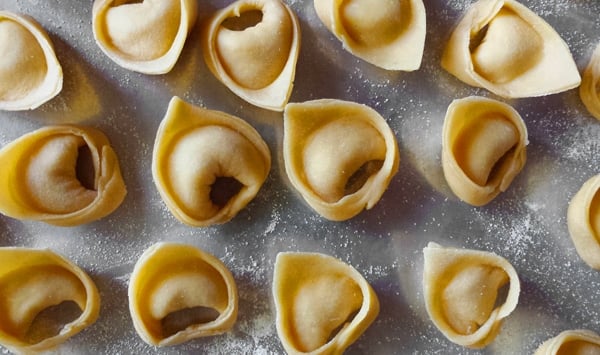
But small they must be, or they’re not real tortellini. You get used to it, and after the first couple dozen or so, you start banging them out quickly. That’s the way it is with pasta. Making it gets you into a zen-like state, where your focus (or at least my focus) is solely on making each dumpling perfect.
I can take in music or a football game, but it’s in the background of my mind. All that matters is making perfect little tortellini. As you can see, some are indeed perfect, but certainly not all.
I am in awe of the women who can do this without thought. You watch them and they’re not even looking at the pasta as they deftly flatten, twist and pinch and toss them into the pile with a barely perceptible flick of the finger. So cool!
Making real tortellini in brodo requires time. It’s simple work, but not easy. It’s a thing to do on a rainy (or snowy) weekend, a chance to be quiet, to occupy your mind not with the troubles of the work week, but with the creation of one of the great gifts anyone can give to another: A bowl of homemade chicken soup. A bowl of love.
Tortellini in Brodo
Ingredients
BROTH
- Carcass and wings of a chicken or pheasant, or 2 ruffed grouse
- 1 chopped onion
- 1 chopped celery stalk
- 1 chopped carrot
- Chopped stems from a bunch of parsley
- 2 bay leaves
- Salt
- A pinch of saffron (optional)
- Parsley leaves, for garnish
PASTA
- 2 cups all-purpose flour
- 2 whole eggs
- 4 egg yolks
FILLING
- 1/2 pound cooked chicken meat (or from another white-meat bird or rabbit)
- 75 grams of finely grated parmesan cheese, about 2 1/2 ounces
- Zest of a lemon, finely grated
- 1 egg
- A few gratings of nutmeg, about 1/4 teaspoon
- Salt and pepper to taste
Instructions
- Start by making the broth. This recipe assumes you roasted the chicken or other game bird at some point earlier. If you haven't, and you are using uncooked carcasses, you will need to roast them at 400°F until nicely browned, which will take about an hour. Once you have roasted carcasses, hack or chop them into pieces with a cleaver or poultry shears and put them in a pot. Cover the carcasses with water by about 1 inch and bring to a gentle simmer. Don't let this boil. Partially cover the pot so some steam can escape, but so the broth doesn't reduce too much.
- Let the chicken simmer very gently for at least 2 hours, and up to 4 hours. When you think you are about 90 minutes away from being done, add all the remaining broth ingredients except for the salt. Simmer for 90 minutes, then strain the broth.To get maximum clarity, a) don't let the broth boil at all during the whole process, and b) strain it through a paper towel set into a strainer by ladling the broth through, not dumping the contents of the pot into the strainer. This is how I got my broth so clear without going through the rigamarole of clarifying it with a raft like a French consomme. Clean the pot and pour the strained broth into it and set it under low heat. Don't let it boil! Add salt to taste.
- While the broth is simmering, made the pasta dough. Pour the flour into a large bowl and make a well inside. Put the eggs and yolks into the well and mix to make a dough. Knead for at least 5 minutes and up to 10 minutes. Wrap in plastic wrap and let the dough rest for 1 hour. BUT... if you have a vacuum sealer, you can seal the dough in a vac-bag and it will hydrate instantly, no need to rest. I do this because making the tortellini is time-consuming.
- Make the filling. Mix the chicken, lemon zest, cheese and nutmeg in a bowl. Taste it. It might not need more salt because the cheese is salty. Add salt if you need to, then put everything in a food processor with the egg. Pulse until you have a paste. Remember this filling is going into little tortellini, so it needs to be fairly smooth.
- Now it's time to make the tortellini. Get a good work surface ready: I use a big maple board, but any large, clean surface will work. Set a little bowl of water near you, to paint the edges of the tortellini with your finger. Get something to cut the tortellini: A ruler and a knife is good, as you will be cutting squares of dough here. I actually use a square cookie cutter, which makes things go much faster. Stuff the tortellini filling into a sturdy plastic bag and squeeze it into a corner. Snip off the corner so you can use the plastic bag like a fancy pastry piping bag.
- Cut your dough into about 8 pieces or so. Keep all the dough you're not using wrapped in plastic. Roll the dough out to No. 7 or No. 8 on your pasta roller; on my Atlas No. 9 is the thinnest setting. Cut out the squares of pasta. How large? Tortellini are supposed to be small, so about 1 1/2 inches if you can. If your fingers are too big to manage those little tortellini, make them larger.
- Pipe about 1/2 teaspoon in the center of the square, about the size of a bean. You'll figure out how much is correct as you go. Fold the square over to make a triangle -- you'll need to paint the edges with water after the first couple of tortellini, as the dough dries quickly. Make sure there's no air in the triangle. Now fold the triangle around your forefinger and pinch together the edges. Set each tortellino on a baking sheet you've dusted with either semolina flour or cornmeal. Keep at it until you've used all the filling. This takes me about 2 hours, which is a fair bit of time, but your broth needs to cook anyway.
- To finish, boil the tortellini in a large pot of salty water -- not the broth, as the starch from the pasta will cloud the broth. When the tortellini float to the surface, let them cook another 30 seconds, then drop a bunch in everyone's bowl. Pour the hot broth over the tortellini and garnish with something green, like parsley leaves.
Notes
Nutrition
Nutrition information is automatically calculated, so should only be used as an approximation.
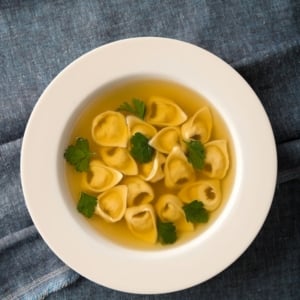
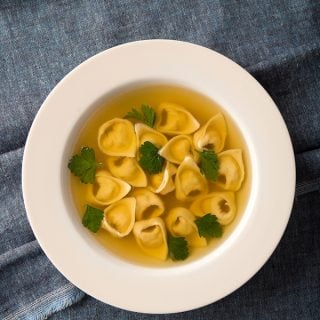
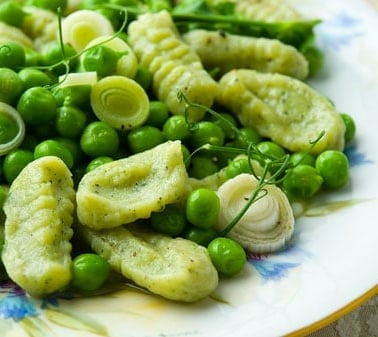
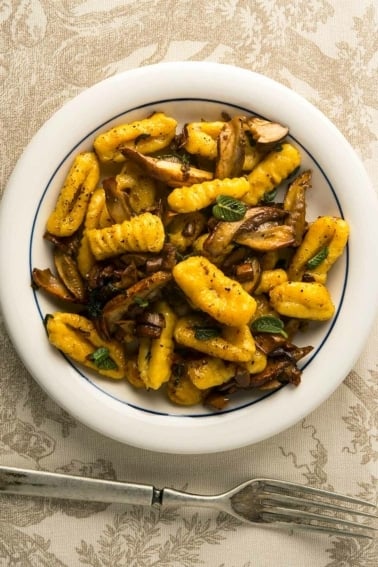
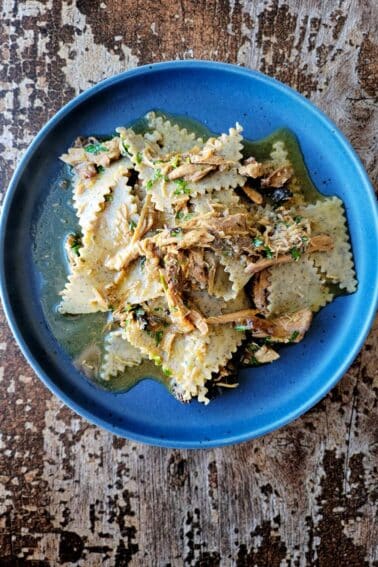
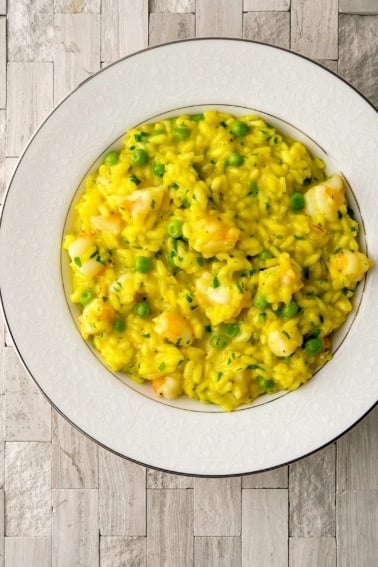
A pox on both your houses!!!
Sorry, I have this terrible habit of being quaint, err I mean annoying…..
I hate to bring it to you but tortellini IN brodo are as tuscan as peanut butter, unless we are happy to say that, given they have chicken stuffing, rather than pork, they belong to a newly created tradition that we arbitrarily place in Tuscany, without asking the locals first. Chicken tortellini in brodo stand on their own without this (rather puzzling) attempt of giving them some sort of back story that is just imagination. Also, the fact that your friend (chef maybe) X is from Tuscany/has worked/has trained in Tuscany suggested this recipe does not make it Tuscan more that the fact that my friend Y who lives in Florence and who is vegan makes all tuscans vegans. Tradition is not a one man band, and this American habit of misinterpreting other people’s culture would have been quaint in 1950, but the internet powered 2014 is just annoying (or worse). In case anybody cares, tortellini are not tuscan to start with.